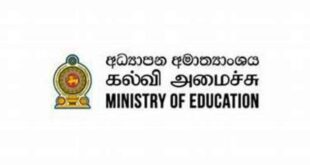Assistant Lecturer, Department of History, University of Peradeniya, Peradeniya.
Introduction
Nationalism is an ideology based upon devotion of interests and cultures of a particular group of people and their belief that they surpass others in the society. In this, nations act independently having established their own law and order and governance. Nationalism which emerged in the Europe is considered as the most powerful and successful political movement of the 18th century. The concepts of Nationalism began to attract many Sri Lankan middle class students who travelled Europe to seek education in British period.
The Indian National Congress was formed in 1885 based on the Indian independence from the Great Britain. Similarly, the Ceylon National Congress was establishedin1919inSriLankawhichmainlyfollowed the structure of the Indian National Congress. The principal demands of the Congress were of two fold. First, to make legislative changes and secondly to provide an opportunity for more Ceylonese to take part in the administration sector. Thus, in this context, it is necessary to examine the importance of the contributions of Muslims in Sri Lanka and their efforts and supports contributed towards achieving the goals of the Ceylon National Congress.
Research Background
As there were only a handful of researches have been done on SriLankan Muslims contribution to SriLankan politics, there has been a serious complexity in understanding the importance of Muslim political history in the country. This study will help to fill this major gap while examining the patriotism of Muslims depicted at many significant occasions before and during the independence.
Co-currently, they continue to face criticisms and challenges in the political arena of the country. Moreover, it is evident that many political leaders
representing the majority population of the country are either doubtful or unaware of the circumstances in which the Muslim community and its’ leaders acted with allegiance and patriotism towards rebuilding this nation since independence. Such are not limited to their continuous struggle for a free state and taking part in agitations over independence carried out by the leaders of the majority community against the British Empire. They stood side by side during the most difficult times of the country and raised common voice in demanding for independence.
Research Objective
- To understand the specific contribution and role of Muslims towards achieving the political goals of the Ceylon National Congress.
- To evaluate the circumstances in which the Muslims supported the majority communities for
- To build unity, love and national harmony among the various cultures and ethnic groups in the country and thereby value and honor each other’s commendable efforts rendered for the independence of this nation.
- To clarify certain misconceptions prevailing amongst some major communities in Sri Lanka on the role Muslims in Sri Lankan politics.
Research Methodology
Primary Sources
This research being a historical one, there is a necessity that it has to be based on primary sources and archival documents. Further, this research will also include evidence from the present times specifically Michel’s Roberts documentation on the Ceylon National Congress. In addition, the document actions avail able
with Ceylon Muslims Association, Ceylon Malays Association and articles written by former Muslim leaders will be utilized to develop this research.
This research will also include information that have been published and gathered from contemporary periodicals, newspapers and journals, such as Muslim Nesan, Muslim Guardian, Sinhala Bauthaya and Dhinamina.
Contemporary magazines ,articles ,essay researches and diaries of former Muslim leaders and the Hansard will be used to support the thesis of the research.
Secondary Sources
Articles, monographs and books by academic professionals would be used as principal secondary sources.
Results and discussion
Ceylon National Congress was a unique political movement comprised of all the communities in Sri Lanka. Their primary goal was to retain and safeguard the political interests and intentions of the Ceylonese from the British Empire. Although this movement mainly demanded for constitutional reforms with more powers, at later time, it began to involve in frequent agitations against the British rule and continued to fight for freedom. Nevertheless, the demands and agitations composed more of racism and were neither serious nor strong enough in its actions when comparing to the Indian National Congress. It was Sir Ponnampalam Ramanathan who initially brought the idea and the extreme necessity for a similar political organization in SriLanka.When examining and analyzing the demands and measures, it is crystal clear that there wasn’t any cause for Muslims to oppose their views. Yet, certain members of the Tamil community and the leaders of the Hill country withdrew from the Congress as a result of inner conflicts within the association. Also G.G Ponnambalam who formed a political organization, the Tamil Congress its main campaign for balanced representationtheso–called“50–50”campaign.They had no support at all from the Muslims. The Muslims continue to remain and retain their support to the various activities carried out by the Ceylon National Congress until the very end.
The Ceylon National Congress was formed in 1919 at the time when T.B.Jayah, S.L.Naina Marikkar and
M.Cassim Ismail were considered to be the most outstanding Muslim leaders and important members of the Congress. In 1922 some popular Muslim leaders, like as Cassim Umar, Mactan Ismail, Ismail S.N, Jayah T.B, Sapar L.M. and Saldeen M.K were chosen as members for the Executive Committee of the National Congress. Considering for the betterment and the need for a prosperous life forthe Muslim community, the Muslim Association, that comprised of major Muslim leaders and the Muslim Youth League, which consisted of the most intellectual youth leaders in the Muslim community, joined together to work with the National Congress. The Muslims also granted their fully support for the Congress when it began its agitations over the Manning Constitutional Reforms in 1924.
Further, T.B. Jaya was elected as the Vice President of the National Congress on the 14th day of October 1925 which could be considered as one of the remarkable event at this instance. It should be noted that despite of the most well-known political leaders such as D.S.Senanayake, S.W.R.D.Bandaranayake, A.E.Gunasinghe, W.A.De. Silva and C.W.W.Kannagkara to name a few, the selection of T.B.Jaya for a most rewarding and executive level position in the Congress, was another outstanding example for the development of Muslims political history. In addition, Riyal Mohamed was elected as the secretary of the congress.
Further, the National Congress also played a vital role by giving an opportunity for Muslims to take part at important occasions. N.H.M. Abdul Cader, Makan Makar and T.B. Jaya were among the members of the board of panel which was formed to submit the measures to the Donamor Commissioners arrive In the countryin1927. In addition, Cassim Ismail was chosen to represent the Muslim community when the National Congress decided to send a delegation to England on the 23rd of January 1930.
Moreover, the political leaders of the Congress tookpart with keen interest and respect at various national celebrations and meetings organized by the Muslims. Specially at a function organized by the Muslim Association of Ceylon on May10th of1935, where Ash Sheik Mohhamadu Fasi was invited to deliver a speech on “Islamic emphasize on Peace”, the major leaders of the National Congress, like C.W.W. Kannankara, A.E. Gunasinghe and M.Mendis also took part with some of the Muslim leaders like Makan Makar and T.B.Jaya. Further, a proposal brought by A.R.Razick in the legislative council on appointing Arabic teachers to
schools it was seconded by Gunawardhene who was main leader of Ceylon National Congress.
Conclusion
Though, at the beginning, some Muslim political leaders refused to join the congress, they joined the congress later concerning the betterment of their mother lanka. The historic vote on the acceptance of Soulbury proposals was held on 9th November 1945 in which all the Muslim members voted in favor. Subsequently, D.S.Senanayake – the main leader of the Congress left this movement and as per the Solberi Commission, he successfully formed the “United National Party” in September 1946, in order to compete in the elections. Thus, the conversion of the National Congress to the United National Party laid many members of the Congress to eventually become the representatives of the newly formed party. In addition, T.B. Jayah – The President of All Ceylon Muslim League and the president of the Ceylon Muslim Association which was the second largest Muslim organization in the country, A.R.Razick then the president of the Ceylon Moors Association – the largest Muslim organization in Ceylon, also joined with the National leaders. Therefore, it is crystal clear that the Muslim leaders who headed the Muslim community, in turn represented the Ceylon National Congress. Further, there were more than fifty significant Muslim leaders who became active members of the Ceylon National Congress between the years of 1919 to 1947. As such, it is evident that the Muslims were always a peace loving community and have devoted much to the Ceylon National Congress and Sri Lanka’s independent.
References
- Arunachalam, Ponnambalam,the Ceylon National Congress, Presidential Address, with the Resolutions Passed, Ceylon National Congress,
- Dewaraja, Lorna, the Muslim of Sri Lanka One ThousandYearsofEthnicHarmony (1900-1915), Colombo: The Lanka Islamic Foundation, 1994.
- De Silva ,K.M ,The Muslim MinorityIn a Democratic Policy, the case of Sri Lanka – Reflections on a theme , colombo , 1984.
- Mrikaar, A.I.L, Markan Markar, A.H, Lafir,A.L.M, The Moors Association: its impact on the community, Colombo, 1976.
- Mohan, Wasundhara,Muslims in Sri Lanka, Jaipur, Aslek pub., 1985.
- Roberts, Michal, ed,Documents of The Ceylon National Congress and Nationalist Policies In Ceylon (1929-1950), of National Archives, Colombo,1977.
- Shukri, M.A.M, and Muslims of Sri Lanka: a cultural perspective, Colombo: International Centre for Ethnic studies, 1984
Post Disclaimer | Support Us
Support Us
The sailanmuslim.com web site entirely supported by individual donors and well wishers. If you regularly visit this site and wish to show your appreciation, or if you wish to see further development of sailanmuslim.com, please donate us
IMPORTANT : All content hosted on sailanmuslim.com is solely for non-commercial purposes and with the permission of original copyright holders. Any other use of the hosted content, such as for financial gain, requires express approval from the copyright owners.
 Sri lanka Muslims Web Portal Sri Lanka Muslims News Center
Sri lanka Muslims Web Portal Sri Lanka Muslims News Center
 Donate
Donate


